Into the Fukushima Zone
of denial, deception and destruction
This journey is an odyssey through strange landscapes into the
operational center of the Fukushima "recovery" campaign. Inside the
exclusion zone, an outsider might expect to be an eyewitness to the
efficiency and discipline of Japan Inc. in its drive to gain complete
control after a dire accident.
Venturing past the 20-kilometer limit, one is instead surprised to discover
quite the opposite - an amorphous netherworld without clear rules
or boundaries, out of sync with rhythm, rhyme and reason. For here,
inside the Zone, lies the numb soul of our machine society, the subconscious
of industrial reality, and the chaos that underlies our imagined sense
of order. The Zone is a space where dreams rot, half-born and half-buried
Outside, the trains have resumed their clockwork precision, while consumers
readjust to the daily routine, but as everyone knows deep down there
can be no going back to before 3.11, the day when nothing would ever
again make sense. On their mental calendar, it is Year 2 BE, beginning
of the end.
Though once-densely inhabited seaside communities were swept into
the deep, and the stench of decomposed flesh still arises from the broken
sea walls, the Zone is not entirely dead, its space is itching with
high energy. It is not a slow-healing wound, as the media would have
us believe, but a fast-expanding tumor. Here, the mere drop of a rod
or the turn of a gene sequence can put a full stop to human history,
and on this soil of mutation, new strains are reorganizing their inner
workings to challenge a damaged human gene pool for the top of the heap.
The mindlessly raging Zone is by now in full command of the body politic,
tossing around the once dominant social ego called Tokyo like a stuffed
doll, while it threatens to eradicate the nation's super-ego, the ancient
cultural tradition rooted in Kyoto. A mere 20 kilometer circle inside
Fukushima Prefecture determines the fate of this nation and for that
matter the rest of the planet.
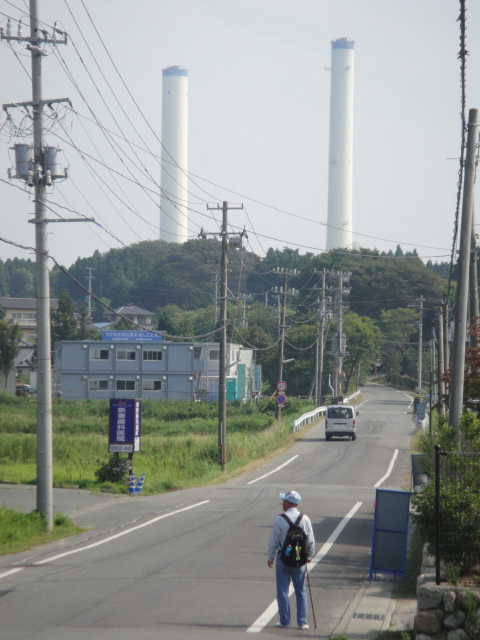 This
odyssey into the exclusion zone runs the gauntlet between sorcerers'
incantations and magicians' illusions, just like ordeal for Ulysses
on his homeward passage from the ruins of Troy - though for us, home
cannot exist anymore, except as a siren song. The only path is forward,
cutting through the spells of the demented physicists, prescriptions
from murderous physicians and warnings by guardians at the gates. If
there's nothing beyond, then at least we know the game's up. This
odyssey into the exclusion zone runs the gauntlet between sorcerers'
incantations and magicians' illusions, just like ordeal for Ulysses
on his homeward passage from the ruins of Troy - though for us, home
cannot exist anymore, except as a siren song. The only path is forward,
cutting through the spells of the demented physicists, prescriptions
from murderous physicians and warnings by guardians at the gates. If
there's nothing beyond, then at least we know the game's up.
When one reaches the main gate of Fukushima 2, through which dump trucks
roar in a cloud of radioactive dust from devastated plant No. 1, one
suddenly realizes that there never was a 20-kilometer line, no ribbon
of yellow tape, not any indicator of a safe limit, for why tell the
foolhardy that they have crossed into the future? The boundary
is a fiction for the media, because the Zone is actually borderless,
ever since the first nuclear explosion lifted a funnel of isotopes into
the jet stream. This is only its nucleus.
For the inmates inside the nonexistent radial line, illusion and reality
are one, death and life are the same, both sharply piercing the lungs
with every breath. For the young men who've come from the outer island
colonies of Okinawa and Hokkaido, the "sensible" alternative of remaining
in their recession-mired outland would be to invite starvation
upon their families. At least here in the Zone, the price of destruction
to their bodies will pay for the next meal and a roof for wife
and child
J-Village, located right next to Fukushima No.2 nuclear plant, is itself
an ironic ending for these young men who as boys dreamed of advancing
into J-League professional soccer. Their prefab trailer houses and outdoor
portable toilets are set up inside a huge outdoor sports complex, where
now the only form of exercise is climbing ladders to run hoses into
damaged reactors.
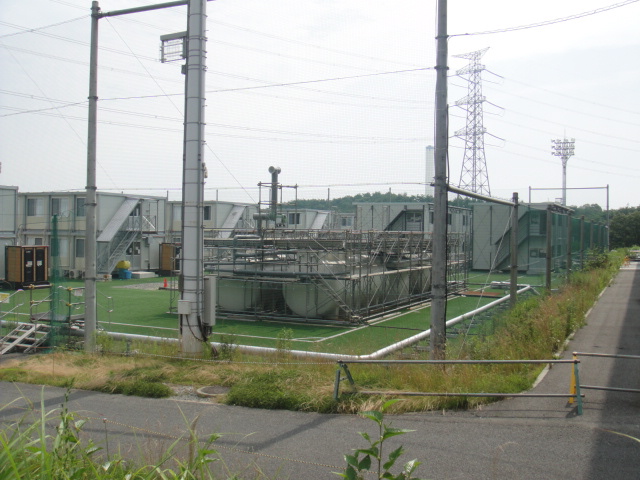
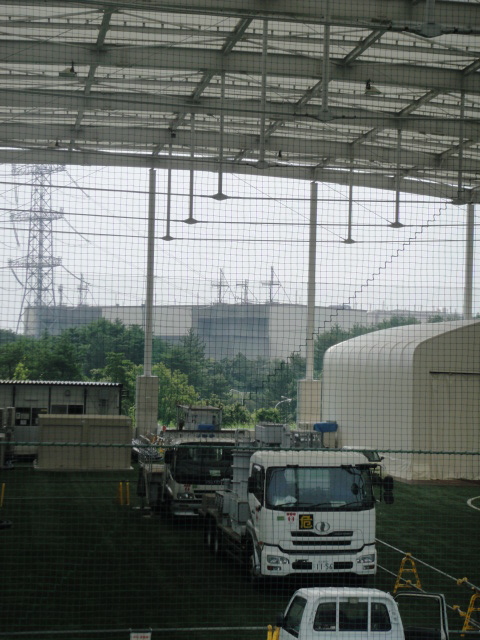
As off-duty
workers scurry toward the showers, they rip off their hepa-masks to
suck in air that will kill them in 6 months rather than in 6 hours.
A couple of passing workers said that the location is strange to them;
all they know of Fukushima is Tepco plants Nos. 1 and 2 along with J-Village.
Most have never met a local resident except for an occasional manager
or foreman. Otherwise, the pay is low and getting fired easy. Show any
sign of illness, and the bosses will put you on an outbound bus with
your termination papers in hand and a bad record on file with every
corporation in the country. For many a fired worker, who has lost his
teeth and hair, despair and debt have led straight to suicide. The only
thing worse than being trapped inside the nuclear gulag is get kicked
out of it.
Incredibly, about the distance of a home run in Tokyo Dome, there are
cabins across the tracks from the nuclear power station. Laundry is
flapping in the wind. An adjoining rice paddy registers 1 milliSievert
per hour; a calculator shows that the inhabitants will be dead within
a span of five months.
Further down the narrow road., I met an old-timer, a resident whose
home had been collapsed by the earthquake. As we walked past a crossroad,
he said, "This here is known as 48 corner." The crossing sits at the
bottom of slope, and despite repeated high-pressure water hosings,.
the radioactivity level consistently remains twice as high as the numbers
being blared out from the town's PA system. Nobody believes what's being
reported over the loudspeakers, probably not even the woman who is doing
the announcing. If everyone believes, then it's surreal, but if nobody
believes, it's insane.
Sitting on a low wall, the retiree tells me: "Did you see the new school
on the way up? The government's planning to force the children to come
back, and the parents will have no choice because the city schools are
going to end enrollment of outside students." Along the road from the
station, I couldn't find a rice ball for breakfast on the empty shelves
of the only store left, all the restaurants were shuttered, and entire
neighborhoods are deserted - but the company town is going to reopen
the school, no doubt so that the parents will have to move back.
Many of the absentee families will return to spanking new homes being
erected by contractors. All around, wooden houses barely touched by
the quake are being torn down. Some of the beams are stacked in dusty
piles, but other rubble is bagged and covered with blue tarps. Touching
blue, my dosimeter reads 0.60 mSv. So the government is remodeling in
order to remove all evidence of major leaks out of Fukushima No.2.
A front door swings open and a smartly dressed woman emerges from a
brand-new duplex home. With the striking looks of a model in a glossy
brochure from a real-estate developer, she doesn't fit the profile of
a country-bumpkin. Womenfolk here wear bonnets, ride bicycles and have
wrinkles. As the lady talks to the construction boss, I notice that
she's wearing a business suit and make-up.
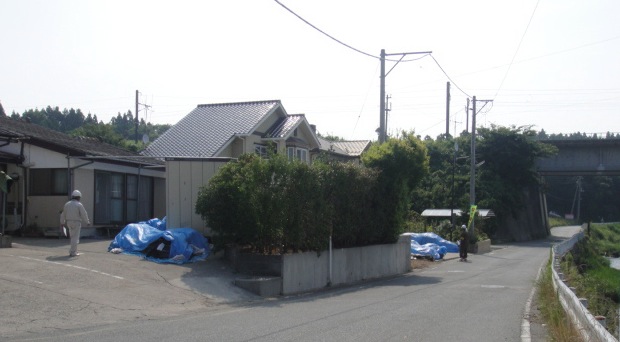
The realization hits me like a sledge hammer, or maybe
it was just satori - there have never been duplexes in these boondocks..
Land is allocated to extended families. These new quarters are out of
a Tokyo architect's catalog, some foreign notion of how the middle class
should live in the suburbs. This is a Potemkin village, the facade of
a new normality of comfort and neatness inside the evacuation zone for
the returnees. Could this housewife be a fake, too? This is the post-disaster
future, a recovery with designer death camps and Stepford wives.
Soon security arrives. Out of an unmarked car, an angry man crosses
the road, shouting at me. "You here to do interviews?"
Was that a question or an accusation? A veteran journalist, I avoid
the mistaken assumption that the law protects everybody except corrupt
bureaucrats and corporate criminals. Instead of reacting with a "And
you the hell are you to be asking me?", my humble-pie response goes:
"Interviews? What interviews?"
"Then what are you doing here at this crossroads?"
"Taking a photo of that roadside Buddha. I came a long way for that
shot."
"Roadside Buddha?" The plainclothesman doesn't know whether to laugh
or cry. "Listen, if you want to do interviews, get something right from
the start: You are to register at the town hall and bring your ID."
"I'll be sure to do it on my next visit, because now that I know how
to register, I'm coming back to do interviews."
"You're coming back?" Head shaking, the security man is out of ammo
and crawls back to his car.
Experienced journalists are old foxes who know how to lead the hounds
into the brambles.
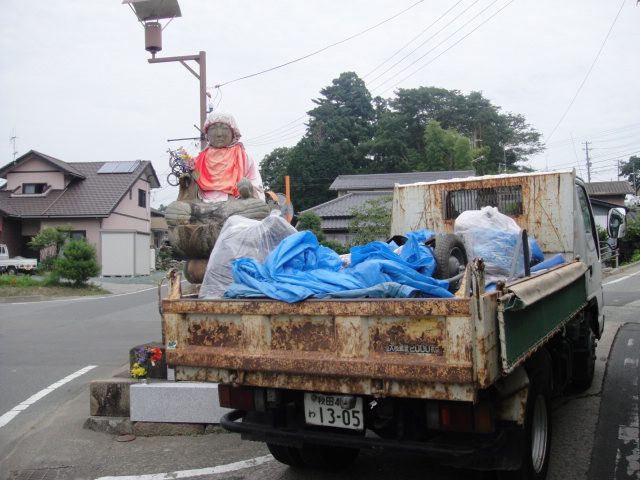
Walking down the road, I enter a tunnel to snap some of the trucks rolling
through with cargos of radioactive rubble from Fukushima No.1. Whenever
a big Hino or Canter rumbles past, the dosimeter leaps twice as high
in only a split-second's passing. According to the government, the meltdown
rubble is being stored inside the compounds of the nuclear stations.
Through this tunnel, however, hundreds of trucks a day pass by homes
and businesses on their way to distant dumpsites in the hilly interior,
or sometimes stopping to transfer their lethal loads onto freight trains.
At Koriyama Station, 70 kilometers from the coast, my dosimeter picked
up a shockingly high 0.58 reading on one side of a passenger platform.
Schoolgirls in short skirts were using the same line and getting off
on that platform. Saddam may have tried hard to obtain weapons of mass
destruction, but he never came close to matching the devious chicanery
from Tepco and the Japanese bureaucracy.
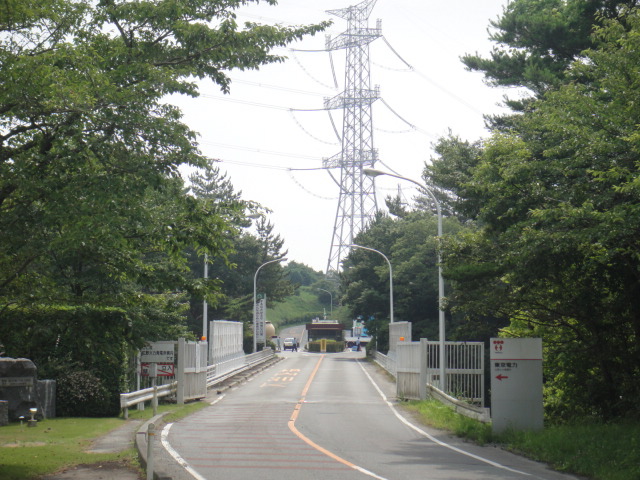
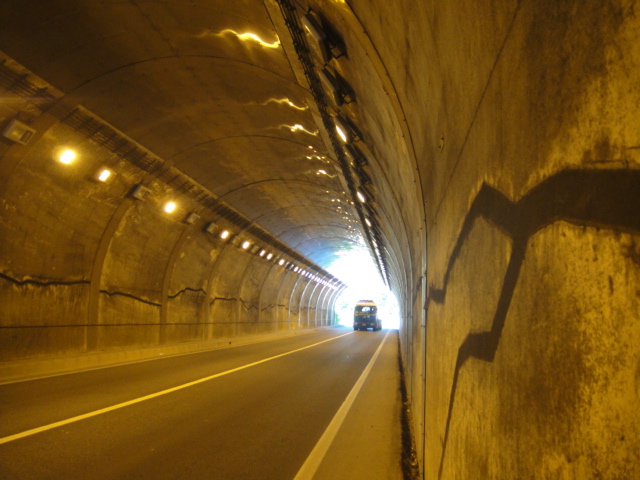
Along a mountain-hugging train line, I stayed at a campground because
there are no rooms available in or near the exclusion zone, Tepco and
its contractors have booked every hotel to maximum capacity. The camp
was outfitted with a government radiation monitoring system. Comparing
the air reading with my dosimeter, the device was honest enough - but
everything else about the rig was a clever deception. The site, on a
bluff over a creek, had been dug out and the soil replaced with new
gravel. From its higher position, two meters above the stream, the readings
were three to five times lower than at the waterside campground.
As I shivered in my hammock against the nighttime downdraft, the readings
shot up to 0.38, a level dangerous enough to set off the geiger alarm,
which woke me up. Stumbling in the darkness up to the monitor, I found
that the solar power unit was down for lack of sunlight. The nightly
shutdown was convenient for Tepco, which does its unpublicized radiation
releases around midnight.
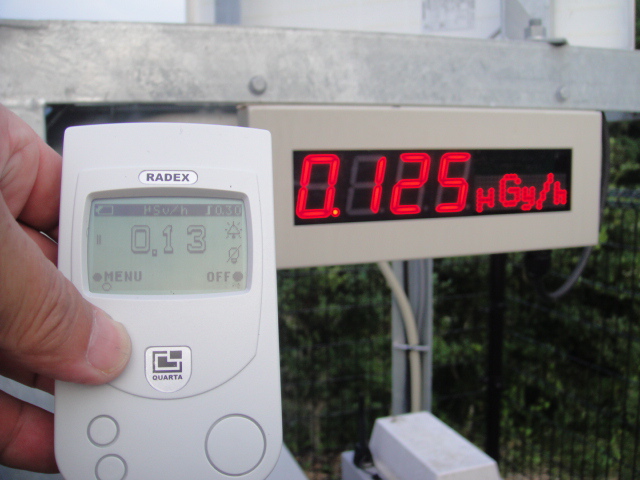
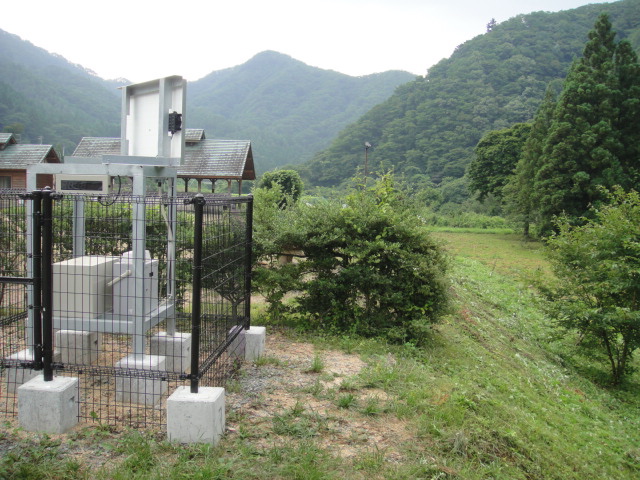
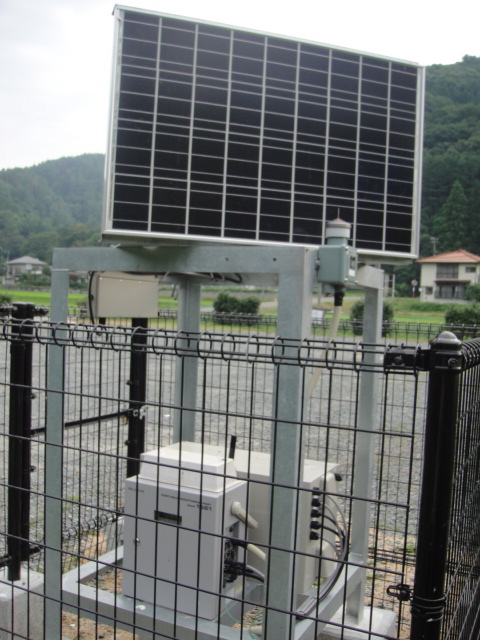
At the crack of dawn, I rolled up my camping gear before heading for
the coast. I was surprised to find a white Toyota stationwagon parked
on the narrow road directly above, its engine idling at 5:30 a.m. Late
the previous night, three raucous fellows amused themselves by shooting
bottle rockets toward me and were cursing a lot, until I told them to
shut up after 10 p.m. After I got a can of coffee from a vending machine
and walked up to the empty train station, the Toyota drove off. This
wasn't a vacation, and I wasn't a happy camper.
On my return from the coast, some seniors who were cutting grass told
me that local people have had "strange experiences" whenever they've
strayed into the mountains. "For many decades," an older gentleman explained,
"security men who are not with the police or military come out of the
woods to accost people and turn them back. There are a lot of hidden
sites in the forests, and many of them are outside the 20-kilometer
zone. So be careful whenever you're up here."
This wasn't some late-night sci-fi movie, it's Fukushima on the road
to recovery. After those words of advice, I recalled the high readings
along a brook that fed into the main stream. A footpath to the hydropower
dam had been roped off. That wouldn't stop me, but
fallen branches and landslides did not permit any further uphill progress.
On a patch of bare ground, I found number of golden scarab beetles in
a circle, dead. Taking their readings, I realized they had gathered
for mating season, but once they got close enough, their combined body
count killed them all. I wondered if the same could happen to a couple
of humans snuggled on a sofa.
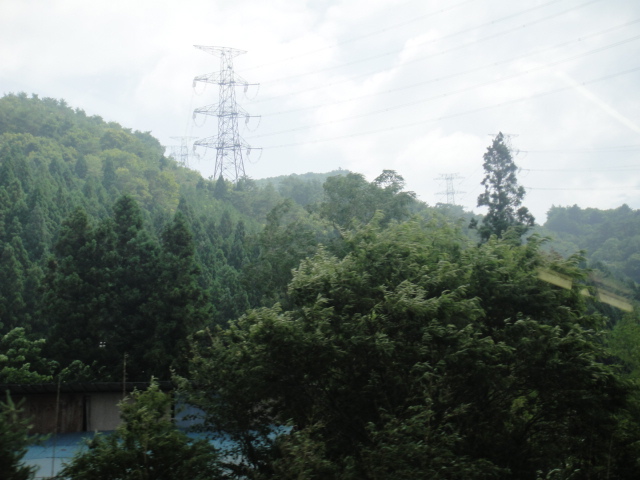
Nearby, water seeping through a cliffside triggered a high measurement.
Why would the water by this tiny brook be so much higher than the campsite
by the wide stream? The answer came in a flash of geology trivia: Uranium
inside the granite. The mountain region of Fukushima is known to be
the only place in Japan with uranium ore. The Imperial Army established
its atomic bomb program here in the 1930s.
To build an atom bomb in those days up until nuclear reactors became
widespread in the 1970s, engineers had to produce heavy water, or tritium,
inside reservoirs. Tritium is used magnify the surge of neutrons that
detonated the uranium or plutonium core. The hydropower dam topside
must have been put there to produce tritium in the uranium-bombarded
reservoir, and an electrolysis system was used to separate out
the heavy water, just like the Nazi scientists had done in Norway. Heavy
water and tiny bits of uranium are still percolating through these hills,
and the old strategic sites remain protected by some untouchable and
unmentionable security force that was watching my movements all along.
Tritium in the water, cobalt-60 in soil samples, strontium and cesium
everywhere, plutonium particles on the ground, xenon gas in the upper
atmosphere that is massively expanding an ozone hole over the Arctic,
the weather going haywire across North America, Europe and Australia,
and the suffocating blanket of lies worldwide about what is happening
here - what does it all add up to?
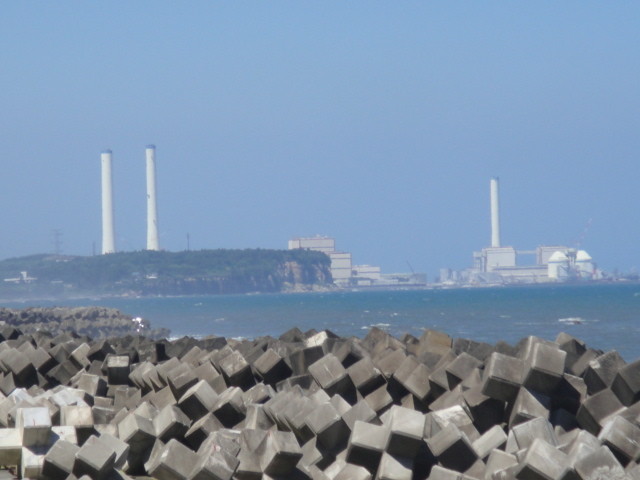
More than 16 years earlier, two radiation releases occurred at the Tokaimura
nuclear station, located between Fukushima and Tokyo. At the time, I
was an editor and investigative journalist uncovering a network of nuclear
physicists and engineers that supported the Aum Shinrikyo sect, which
was involved in the Tokyo subway gassing and before then the smuggling
of advanced weapons technologies out of the former Soviet Union.
My reporting team tracked the mystery as far as possible could before
we were removed by government order. Threats and the violent death of
a senior editor blocked any further search for the secret programs involving
nerve gas and warheads. Now, at last, inside the Zone, the circle is
closing, and the truth is starting to emerge.
The barely concealed bomb program is supposedly for Japan's future defense
against a resurgent China. The Aum investigation informed us otherwise,
however, that there are powerful conservative sponsors who seek to avenge
the defeat, to even the scales for Hiroshima and Nagasaki. If the 3.11
disaster has stymied the possibility of a Third World War, or Final
War, as the Aum cadre used to call it, then there may be a silver lining
to this radioactive cloud. On the other hand, maybe the war is already
well under way as deadly particles drift across the Pacific and Arctic,
reaching every inhabited corner of the world.
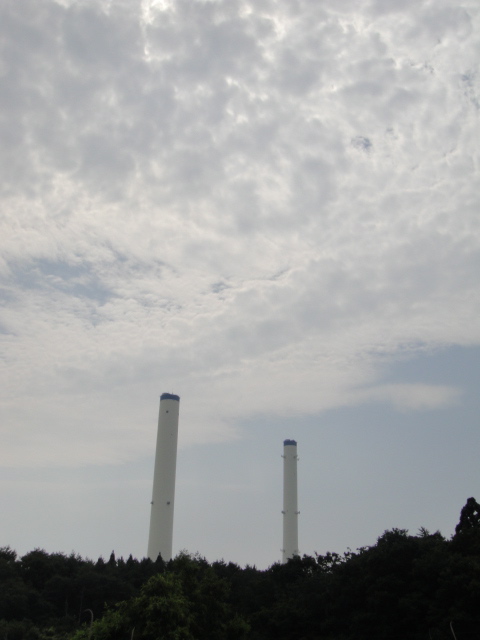
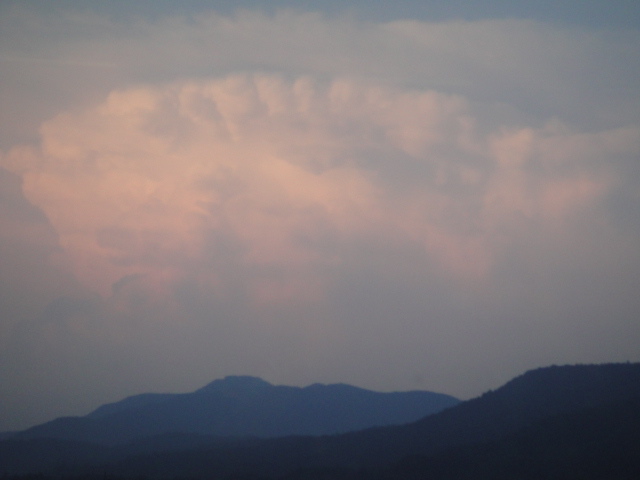
The summer odyssey did not end in Fukushima but continued with further
journeying up to mountain peaks near Tokyo and on the southernmost tip
of Kyushu. Radiation was streaming in from the Japan Trench, driven
by a Pacific high pressure front and then a typhoon. The whistling and
moaning of the hot winds that drove the strangely self-illumined clouds
were a requiem for a dying planet.
On the long hike up that forested volcano, I stumbled upon the one spot,
a lava hollow on the leeward side, with a 0.00 reading - the holy grail
in a radiation-poisoned world. There, I had just
startled a doe and her fawn. Selflessly, the mother deer jumped across
the path to divert my attention from her baby. When our "intelligent"
species' brightest minds have wrought global destruction and refuse
to accept responsibility for their crime against life on earth, how
is it that this wild forest dweller could show the noblest quality of
character? And how could a child of nature have known that this mountainside
is the only safe place to raise the next generation? It is getting too
late for our kind, and so at this darkening hour I could only wish that
nature will find a way for her to survive.
As for us, demented brutal beasts who arrogantly consider themselves
superior to other creatures, there's no point in wishing for another
chance or hoping for anything exalted as redemption, because humankind's
odyssey will soon be over. We had our moment to reach for glory, and
instead we blew it.
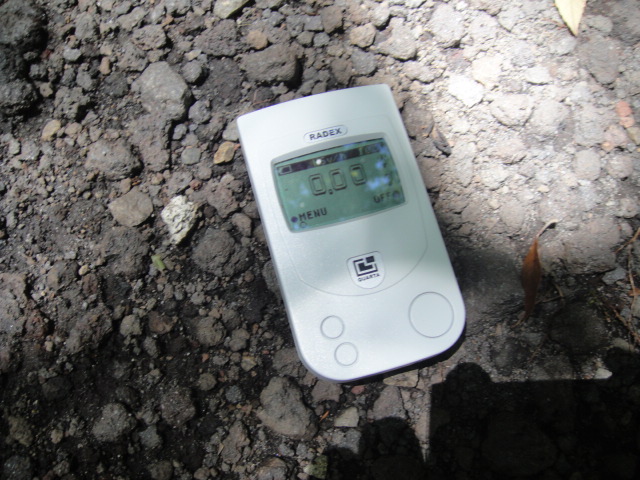
----
Yoichi Shimatsu , former editor of The Japan Times Weeklly, is an environmental
writer and consultant based in Hong Kong and Thailand.
|
![]()